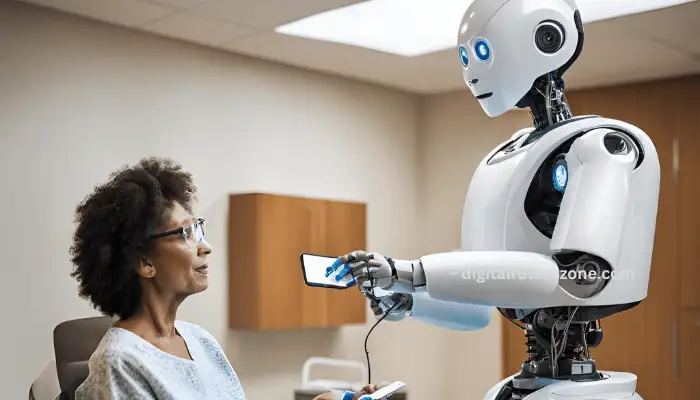There has been a seismic shift in patient care using Artificial Intelligence (AI) over the past decade through increased diagnostic accuracy, personalization of treatment, and overall efficiency within healthcare. One of the exciting areas that is seeing growth in this domain includes AI being instrumental in advancing the field of oncology, aiding cancer diagnosis and therapy. The integration with real-time data and predictive analytics allows healthcare providers to make better decisions, which will boost developments in medical care for patients undergoing cancer treatment.
AI for Personalized Treatment: Understanding the Complexity of Cancer

One thing about cancers is that they are highly heterogeneous. This has made it difficult to design a standard treatment strategy. Patients with cancer require continuous and timely monitoring, as they are at high risk of clinical deterioration. Due to its capacity to handle immense, intricate datasets, AI creates personalized treatment plans via analysis of a unique cancer type in an individual and day-to-day genome. Very importantly, this personalized strategy is expected to lead to deep learning models that not only can predict differential sensitivity but also tolerate CYP2D6*1/*5-like variability in a way that allows for improved and optimized treatment efficacy with minimal adverse effects and better patient outcomes. AI involvement during genetic and molecular data analysis could generate targeted therapies, which are more effective in comparison with traditional treatments due to their accuracy.
Market for AI in Oncology Expected to Grow
According to a report by Global Market Insights, the market for AI in oncology is expected to burgeon at a CAGR of nearly 46% and a forecasted valuation of $7.6 billion over 2032, due to growing acceptance of this technology across cancer diagnosis and treatment initiation. In oncology diagnostics, the AI segment was already in place as early as 2023 (US$341.4 million), which magnifies concerns about the more widespread use of this emerging approach within medical research and development. The strength of AI systems seems to lie in their ability to understand extensive medical information, for instance through imaging scans and genetic profiles, with great precision; the type of data that is most arduous even–at least timely. In one of the top cancer hospitals in eastern India, the Dozee system’s contactless monitoring with an AI-based Early Warning Score (EWS) for identifying clinical deterioration was used on oncology patients. This AI tool was connected to 12 beds and kept updating the live parameters over a period of six months. These results were compared to the standard Modified Early Warning Score (MEWS) collected every 4 hours. However, this AI-based EWS was only topped by the existing standard in recognizing critical medical conditions and also achieved very high sensitivity.
From Early Detection to Rapid Response
In the last 15-20 years, there have been substantial efforts in health care professions concerning strategies for optimization of human resources, especially in the oncology field. The current approach is early detection and fast response. The National Health Authority (NHS) brought out the national early warning score — NEWS which was changed to News2 for brain function. These scores were expanded into the MEWS with the addition of renal function monitoring. The advancement of AI has played no small role in these strides. Earlier detection and more precise continuous monitoring facilitated by AI can help to better patient outcomes while simplifying the process of managing oncology patients.
Summary & the Future of AI in Oncology
The opportunity for AI in oncology is vast, but there are many issues that will have to be solved before this vision can become a reality. As AI can potentially affect patient care, accuracy and reliability are critical. Moreover, data privacy and security issues need to be taken care of meticulously, owing to the sensitive patient information involved. Technology vendors, healthcare organization collaboration remains a major hurdle in the integration of AI into existing healthcare workflows, and this requires close consideration from both sides to allow for implementation in a seamless manner. Despite these hurdles, however, the future of AI in oncology is bright. The continued march of AI technologies, in tandem with the growing cooperation between technology companies and intellectuals, like their counterparts in healthcare services or fundamental research institutions—are forging more creative ways to address our most pressing challenges. These interactions are crucial in helping to circumvent some of the current constraints on AI and for making sure this powerful new technology is put to best use against cancer.
Concluding Thoughts: Going Forward AI in Precision Medicine
There is no question that the role of artificial intelligence in precision medicine, especially oncology, will continue to be significantly more than ever before as AI continues budding. Artificial intelligence can interpret large datasets and create individualized treatment regimens, transforming how cancer is identified and treated. Despite the obstacles that still need to be overcome, AI has a huge impact itself on the trajectory of oncology in this present era due to its improvement and introduction into healthcare systems. As AI becomes more part of the fabric of cancer care, it is certain to improve patient outcomes and streamline healthcare delivery.
FAQs
Get to know me: How can AI help perfect personalized cancer therapy?
AI can help in providing tailored therapeutic directions for cancer patients based on their unique genetic and molecular profile leading to more accurate outcomes with fewer side effects.
How big is the AI in the oncology payor market?
The global AI in the oncology market is expected to grow significantly over the forecast period, and sales of such drugs are estimated to be worth USD 7.6 billion by 2032 due to increasing use of artificial intelligence (AI) for cancer diagnosis and treatment plans.
Helping Of AI In Early Detection in Cancer Care?
Artificial intelligence can analyze complex medical data more accurately, aiding early detection of high-risk medical conditions that result in improved patient prognosis.
What are some of the challenges in incorporating AI into oncology?
Challenges include developing, validating, and verifying the accuracy of AI algorithms; meeting requirements for data privacy and security; as well as integrating AI into workflows surrounding clinical practice in healthcare.
Automation in oncology diagnostics: What AI has to do with progressing oncologies?
AI in oncological diagnostics speeds up the analyses of imaging scans and genetic profiles, thereby enabling quicker (and more accurate) diagnoses.
